Mobilize Workers Power to Halt the Genocidal War!
Bay Area ILWU Local 10 Calls for Labor Boycott of Arms to Israel
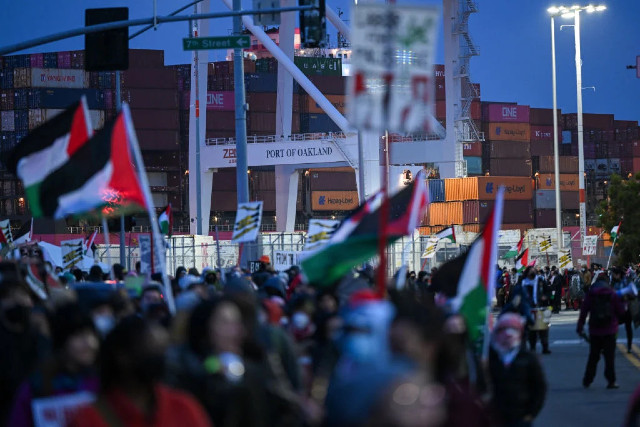
Thousands protested on January 13 against a military ship in the Port of Oakland, California, effectively shutting down the port to demand an end to the genocidal war on Gaza. On May 1, the Bay Area longshore local unanimously passed a motion declaring “the ILWU will refuse to handle military cargo to Israel” and “will honor picket lines protesting the war on Gaza.” Unions worldwide should mobilize their power against the U.S./Israeli war on the Palestinians. (Photo: Tayfun Coskun/Anadolu)
Meeting on May 1, International Longshore and Warehouse Union (ILWU) Local 10 in the San Francisco Bay Area unanimously passed an important resolution denouncing “the genocidal war on the Palestinian people in the Gaza Strip,” and stressing that “all the heavy bombs being dropped on Gaza are supplied by the United States, as are all the warplanes from which they dropped.” Recalling that the “ILWU has a long history of defending the rights of the Palestinian people,” the resolution for the union’s convention declares “the ILWU will refuse to handle military cargo to Israel” and “will honor picket lines protesting the war on Gaza.” Also due to the union’s stop-work meeting, the port of Oakland was shut down all day on May Day, the international workers day.
Palestinian unions in Gaza, under the bombing and murderous attacks by vengeful Israeli occupation troops, had appealed to labor internationally, and to unions in the United States in particular, to “be our voice” and undertake action against the slaughter. The call went out from workers in Gaza, and ILWU Local 10 answered, loud and clear. This strongly worded resolution (reprinted below), by a key local of a powerful union with a track record of fighting on behalf of the oppressed and against imperialist war, could help spur workers around the world to concrete action against the Zionist and imperialist war. A first step should be for labor activists and supporters to widely circulate the motion and call for similar action by their unions.
From the very outset of the Israeli war on Gaza last October 7, it has been clear that this is a joint war of the Zionist military machine with its United States patrons, and that it is a genocidal slaughter aiming to destroy the Palestinian people of the Gaza Strip. This is not an “Israel-Hamas war,” as the U.S. media call it, but indiscriminate mass murder of tens of thousands. The large majority of the dead are not soldiers but children and women killed as their homes are bombed into oblivion. The survivors have been pushed into the desert, deprived of food, water and electricity. Medical facilities, schools and essential services are deliberately targeted for destruction as the Zionists, using heavy weaponry supplied by the U.S, imperialists, seek to make Gaza unlivable for Palestinians.
From the beginning, the Internationalist Group and League for the Fourth International called “For International Workers Action Against the Attack on Gaza,” in our article “Defend the Palestinians Against U.S./Israel Genocidal War on Gaza!” (10 October 2023).1 Concretely, we said, this “could include workers action against the shipment of arms to Israel and Ukraine” (where the U.S. and NATO imperialists are waging a proxy war against Russia through the Kiev puppet government of fascists and nationalists that took power in a 2014 coup d’état). On 16 October 2023, the Palestinian General Federation of Trade Unions (PGFTU) in Gaza issued an urgent appeal to labor internationally, “calling on trade unions in relevant industries:
“1) To refuse to build weapons for Israel.
“2) To refuse to transport weapons to Israel.
“3) To pass motions in their trade union to this effect.
“4) To take action against complicit companies,” etc.
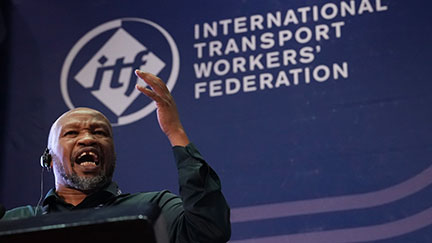 Irvin Jim, general secretary of the National Union of Metalworkers of South Africa, presenting motion calling on unions to boycott arms to Israel at meeting of the International Transport Workers’ Federation. (International Transport Workers Federation/X)
Irvin Jim, general secretary of the National Union of Metalworkers of South Africa, presenting motion calling on unions to boycott arms to Israel at meeting of the International Transport Workers’ Federation. (International Transport Workers Federation/X)
A number of unions internationally issued statements that they would refuse to transport war cargo to Israel, including transport workers in Belgium and dock workers in Barcelona, Spain. In Italy, combative “rank-and-file” unions actually shut down ports, brought tens of thousands of workers into the streets, and have now twice carried out one-day national strikes in solidarity with the Palestinians. In the U.S., several unions took up the PGFTU appeal, notably four in the Portland, Oregon area – IUPAT Local 10 (painters), Ironworkers Local 29 (structural steel), IBEW Local 48 (electrical workers) and AFT Local 111 (educational workers) – due to efforts by Class Struggle Workers – Portland.
But for the most part, unions in the U.S. have focused on pressuring the government to call for a ceasefire (which the hardline pro-Israel administration of Democratic president eventually did – to no effect) instead of calling for independent labor action, and mostly they just issued paper resolutions, as veteran longshore union activist Jack Heyman stressed in an article (“Dock Workers: Block Military Cargo to Israel Against the Genocidal War on Palestinians in Gaza!”) that has been widely circulated in left and labor circles. Then in mid-March, the PGFTU issued a second appeal, specifically addressed to trade-unionists in the United States, making many of the same points and calling on them “to be our voice and advocate inside and outside America.”
Meanwhile, the National Union of Metalworkers of South Africa (NUMSA) has taken up the call for labor action to stop arms transport to Israel. At NUMSA’s initiative, the African regional conference of the International Transport Workers Federation (ITF) passed a resolution on March 7 that “calls on all ITF affiliates to support workers refusing to handle goods linked to Israel’s occupation,” and for other concrete actions in solidarity with the Palestinian people. The South African powerhouse union also issued a May 1 statement, “NUMSA dedicates Workers Day to the struggle of the people of Palestine,” highlighting past actions of the Bay Area ILWU against Israeli ships in previous Zionist wars, as well as against the apartheid regime in South Africa.
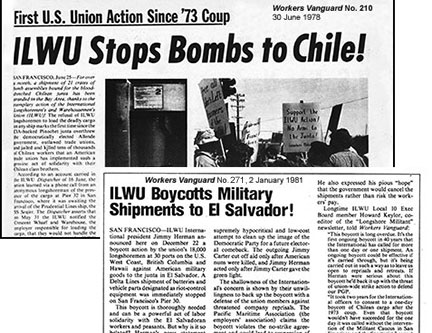 In 1978, the ILWU boycotted a shipment of military cargo to Chile, an action that class-struggle militants in the union had been calling for ever since the 1973 Pinochet coup. It did so again in December 1980, refusing to load munitions for the Salvadoran junta. (Internationalist photo)
In 1978, the ILWU boycotted a shipment of military cargo to Chile, an action that class-struggle militants in the union had been calling for ever since the 1973 Pinochet coup. It did so again in December 1980, refusing to load munitions for the Salvadoran junta. (Internationalist photo)
It is in this context that ILWU Local 10 unanimously adopted its resolution, “on this May Day 2024,” to “refuse to handle military cargo to Israel, as requested by the PGFTU and seconded by NUMSA, and as our union already did in 1978, refusing to load bomb parts for the Chilean military junta, and as it also did in 1980, refusing to load arms to the military junta of El Salvador; and will honor picket lines protesting the war on Gaza, as we have done repeatedly in the past.” The resolution will go to the union’s convention and Longshore Caucus in mid-June in Vancouver, British Columbia, Canada. Already last December, the ILWU’s Canadian area called for an end to the war. But there is an obstacle: the role and position of the union leadership.
The Local 10 resolution is an about-face from the shameful silence on the Gaza war of the ILWU’s tops led by International president Willie Adams, who has backed Israel since going on a 2006 junket sponsored by a Zionist outfit. But if the upcoming convention approves the motion, it wouldn’t be the first time that the powerful West Coast dock union bucked its own bureaucrats. The resolution cites Local 10’s historic 1984 boycott of the South African ship Nedlloyd Kimberly to protest apartheid rule, an action that the union tops repeatedly tried to squelch. And the ILWU’s May Day 2008 shutdown of all 29 U.S. and Canadian Pacific ports against the war on Afghanistan and Iraq also overcame opposition from the union leaders and the maritime bosses.2
Underlining the potential and importance of the ILWU Local 10 resolution, we print below excerpts from an interview by the Labor Video Project with Jack Heyman, who authored the May Day 2024 motion, as well as motions for previous ILWU actions, including the 2008 May Day strike against the war and the 1999 West Coast port shutdown demanding freedom for class-war prisoner Mumia Abu-Jamal.
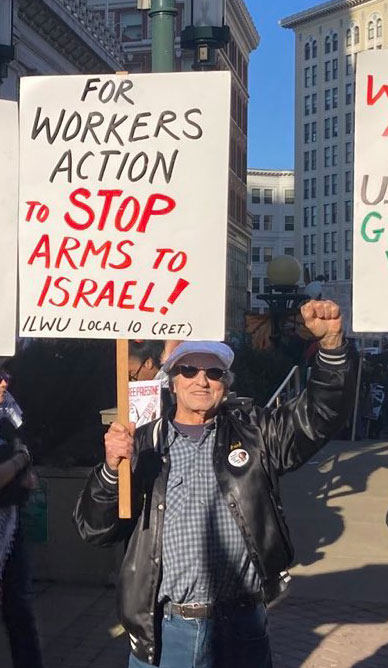 Jack Heyman at December 2023 Bay Area labor solidarity with Palestine march. (Internationalist photo)
Jack Heyman at December 2023 Bay Area labor solidarity with Palestine march. (Internationalist photo)
Jack Heyman: In 2008, the union leadership was opposed to that resolution. Nevertheless, the ILWU is still a democratic union, and the opposition to the president in favor of shutting down the coast prevailed. I think this is a similar scenario. Some of the ILWU locals on the West Coast are opposed to the war. That is, Local 10 here in San Francisco/Oakland, Local 8 in Portland, the Marine Division of the ILWU, which is the Inlandboatmen’s Union, and ILWU Warehouse Local 6. Local 5 in Portland, the Powell’s Bookstore workers, had a resolution that’s coming up again at the convention because it was voted down at our International Executive Board meeting chaired by the president of the ILWU, who is an unabashed supporter of the Zionist government.
So there’s going to be an interesting struggle at the convention, and the [longshore] caucus which follows. From where I’m sitting, I think that Netanyahu is insistent on raiding Rafah and it’s going to be a massacre on steroids. We’ve already seen 42,000 dead, mostly children and women. Going into Rafah, which is more or less the last refuge left in the Gaza Strip, it’s going to be a catastrophe, another nakba.
The Palestinian General Federation of Trade Unions issued an appeal calling on all transport unions to refuse to load Israeli cargo in general, and specifically and especially not to handle war materiel. We want to “hot cargo” that war materiel. NUMSA, the National Union of Metalworkers of South Africa, the largest union in that country, has come out with the same position calling for workers around the world to refuse to handle Israeli cargo based on those two appeals to trade unions.
Labor Video Project: Local 10 at its May Day meeting voted unanimously to refuse to handle military cargo and any cargo going to Israel.
Heyman: We have the power, the working class has the power to shut down this war, but we need to do it in a coordinated way. It can’t be one union here and another union there, because the Zionists will always find a way, if we’re split up like that, to get what they need. The only way this could really be effective is if it is coordinated internationally and that means we’re going to have to have some sort of support from the International Transport Workers Federation (ITF) and hopefully from the International Dockworkers Council (IDC). These are important trade unions that organize the transport sector, particularly in maritime.
So I think our convention is going to be important politically for the working class. If they [the Israeli military] go into Rafah in a continuation of this blood lust, it’s going to exponentially raise the level of struggle. More and more people are going to get involved in this. It’s already happening on the campuses, it’s going to spread more to the trade unions that have the power to actually stop the war materiel from going to Israel.
Labor Video Project: What do you think about the recent attacks of the Zionists and fascists at UCLA [University of California at Los Angeles], mobilizing to shut down these encampments? And what should labor do about them?
Heyman: You know, I’ve seen this film before. This didn’t just start in 2024. You had attacks like this by Zionists back in the ’70s. You may remember the Jewish Defense League, the JDL. They were a fascistic group, a Zionist group that went around attacking anybody who dared to criticize Israel.
I think it’s incumbent upon the labor movement to stand up for free speech, for the right of students to organize, for the right of students to have an encampment. The trade-union movement has picket lines, and to the extent that they’re effective is whether they’re able to show people, to demonstrate that picket lines mean don’t cross. I think the students have the same right to encamp on the university property. It’s their property. The attack down in UCLA was horrendous, and to see politicians of both parties – the Republican and the Democratic party – supporting these attacks is just an indicator of where this country is headed. I think the labor movement should and could come to the defense of the students.
Labor Video Project: How could they do that?
Heyman: Well it’s kind of like what happened here on a small scale [in 1980-81 in Contra Costa County]. There was a black family, a member of the ILWU, that moved into a previously white neighborhood and their windows were broken, [the racists] tried to firebomb the house. So that question was brought before the membership of Local 10 and [we fought] to organize defense squads to go to the house, 24/7, around the clock.
The longshore union has a long history of fighting oppression. Our union came out of the 1934 [West Coast dock workers] struggle, when police killed two strikers, shot them in the back. To this day we don’t allow police to be members of our union. They’re not part of the working class. Whether it’s oppression from the state or oppression from right-wing or fascistic groups, it’s in the interest of the trade-union movement to defend these expressions of protest against the Israeli genocide. That’s what the students are doing, and it’s in the interest of the working class to defend those students, whether it’s at UCLA, at Columbia, wherever.
You know it was workers and students in 1968 that almost toppled the bourgeois government in France. If the workers here organized with the students, we could have a similar dual power situation in this country. But it’s really incumbent on unions to at least defend the free speech rights of students.
Labor Video Project: How are you going to try to get support for that resolution, going to the ILWU convention in Vancouver?
Heyman: The interesting thing about the convention is that the largest body in the ILWU that has publicly come out against the war is the Canadian sector. That’s really important and is a basis for organizing other locals of the ILWU – that the host is opposed to the war. The problem is we have an International president and officers that have not spoken out against the war. That’s a big problem, because that’s a 180-degree turn from previous administrations of the ILWU.
The ILWU has always opposed U.S. imperialist war, going back to the Korean War [of 1950-53]. In the midst of the McCarthy period, we opposed U.S. imperialism and we defended the Koreans and the Chinese. So for [the ILWU top leaders] to now support the U.S./NATO war in the Ukraine, that is, the International officers of the longshore union defending this Zelinsky/fascist government – fascistic, anyway, with the Azov Battalion and so forth – is unconscionable. There’s a real sea change in the ILWU, to the right unfortunately.
Where we’re best in terms of going up against the bureaucracy is there still is a modicum of workers democracy in the union, number one, and number two, the convention is going to be held on the turf of the ILWU Canada. And I think we have a chance to organize other unions, because day by day there are more people becoming opponents of this war, and others who are defending the rights of students to have encampments to protest the war. Thanks to Netanyahu and his fascistic government, a movement is growing and I think there’s a good chance next month that the ILWU will take the position, which it has done historically, of opposing this war.
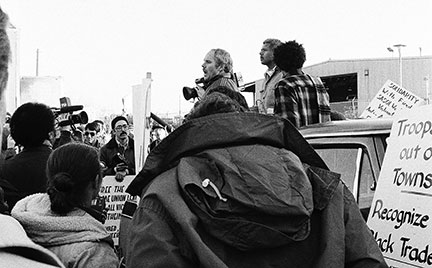 ILWU Local 10’s 1984 anti-apartheid action, picketing South African ship Nedlloyd Kimberley for eleven days. Speaking is Larry Wright. (Archive of Candice Wright)
ILWU Local 10’s 1984 anti-apartheid action, picketing South African ship Nedlloyd Kimberley for eleven days. Speaking is Larry Wright. (Archive of Candice Wright)
In 1984 it was in the longshore union here in San Francisco that the union members voted to strike against the first ship that came in from South Africa, to oppose that government which was in ’84 shooting down miners for striking, arresting the leaders and so forth. We did that for eleven days protesting the apartheid government. That’s what our union has always done, defend the oppressed, not the oppressor.
Another point here is that this convention is taking place on the week of Juneteenth [marking the day when slavery was finally formally abolished in the United States]. I know that particularly resonates in Local 10, which is a majority black union identifying with the Palestinian people.
Labor Video Project: What about the [Israeli] Histadrut? The AFL-CIO [U.S. labor federation] is directly connected with the Histadrut, which calls itself a trade union, [but] which was involved in supporting apartheid South Africa with military equipment. They worked to overthrow governments in Latin America, armed death squads. What is the relationship of U.S. labor to the Histadrut, and should they have a relationship with it?
 The Histadrut is not a workers union but an instrument of Zionist rule and domination over the Palestinians.
The Histadrut is not a workers union but an instrument of Zionist rule and domination over the Palestinians.
Heyman: The officials of the AFL-CIO have a very close relationship with the Histadrut and with the Israeli government. I don’t know if I’d even categorize the Histadrut as a union because they have a massive ownership in land and factories and things like that. When the PGFTU was bombed in Nablus on the West Bank [in 2002], they said nothing. We on the other hand, in ILWU Local 10, sent an open letter to the Israeli consulate here in San Francisco protesting that attack on the trade-union headquarters.
So many unions in this country give a blank check to the aggressive militaristic foreign policies of the U.S. and the Israeli Histadrut has a close relations with the same bureaucrats that support every imperialist war of the U.S. To me, this hearkens back to the 1960s when, just before Martin Luther King was assassinated, he made that famous speech in Riverside Church calling the United States government the greatest purveyor of violence in the world. That hasn’t changed since the Vietnam War for sure. We need to fight here in this country to change the leadership. We need a class-struggle leadership, which doesn’t exist now. Certainly in Israel they need to get rid of the Histadrut, which is not really a trade union, and form their own union independent of the government.
In this country, the key thing is for the unions to be independent of the government. I just reread a pamphlet the other day that Trotsky wrote, “Trade Unions in the Epoch of Imperialist Decay.” He points out that the main task is to demand independence of the trade-union movement from the government because there’s a tendency under imperialism for unions to come together with and be inextricably linked to the government, and that’s got to be broken.
Labor Video Project: What effect do you think this resolution will have on the rest of the labor movement if the ILWU does that? Because the government, the Biden administration, may come in and try to stop it, or use the Taft-Hartley law3 to threaten you with all kinds of legislation and laws.
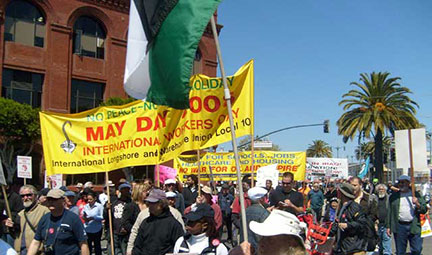 May Day 2008 ILWU walkout shut down all 29 ports on the U.S. and Canadian West Coast demanding an immediate end to the “bloody war and occupation for imperial domination” in Afghanistan and Iraq, in the words of the motion crafted by Heyman for Local 10 and adopted by the union’s Coast Caucus in February 2008. (Internationalist photo)
May Day 2008 ILWU walkout shut down all 29 ports on the U.S. and Canadian West Coast demanding an immediate end to the “bloody war and occupation for imperial domination” in Afghanistan and Iraq, in the words of the motion crafted by Heyman for Local 10 and adopted by the union’s Coast Caucus in February 2008. (Internationalist photo)
Heyman: You know, one of the shortcomings of the 2008 action, where we shut down all the ports on the West Coast, was that it was only ILWU that took that kind of action. We had some local unions marching with us on the Embarcadero to the tune of The Internationale. But it’s really important for trade unions to build a class-struggle leadership, not these class-collaborationist leaderships that go along with whatever the employers want, or the government. That’s not going to be an easy fight. The best way for the ILWU to defend itself will be to reach out to other unions, and there is motion now in different European unions.
Certainly in South Africa, NUMSA has taken some tremendous actions in coordination with the ILWU. For instance, just last year, in 2023, they had a big demonstration for [imprisoned former Black Panther] Mumia Abu-Jamal in Pretoria, the capital, in front of the U.S. embassy there. So we need to coordinate trade unions backing each other up. It’s really simple. It’s called solidarity and it’s something that too many unions have jettisoned. The basis for the trade-union movement to survive and flourish is solidarity, and that solidarity sometimes will be interpreted by the government as being unpatriotic or too radical, or that they’re terrorists or they’re Communists or whatever. So really the key thing here is going to be solidarity. Coming out of the convention, if we pass the resolution, you’re right, we can expect to have tremendous repression of all sorts from the government. The only way to beat that is with solidarity, and it’s going to have to be international, it can’t just be in this country. ■
Local 10 Caucus Resolution on Gaza and the West Bank
Whereas, the genocidal war on the Palestinian people in the Gaza Strip has now gone on for more than 200 days, with more than 42,000 dead and almost 80,000 seriously wounded; and
Whereas, on March 7 the headquarters of the Palestinian General Federation of Trade Unions (PGFTU) in Gaza was demolished by Israeli bombs; and
Whereas, all the heavy bombs being dropped on Gaza are supplied by the United States, as are all the warplanes from which they dropped; and
Whereas, ILWU has a long history of defending the rights of the Palestinian people and calling on Israeli soldiers and settlers to stop the beating and killings of Palestinians and the occupation of their land in resolutions passed in 1988 and 1991 Conventions, the highest bodies of our union; and
Whereas, in 2002, when the Israeli military bombed the headquarters of the PGFTU in the West Bank, ILWU Local 10 officers sent an Open Letter to the Israel Consulate in San Francisco condemning that unprovoked attack; and
Whereas, on April 5, 2003, Harry Belafonte, civil rights leader and famous singer, joined ILWU in leading an anti-Iraq War protest in Oakland. Two days later anti-war protesters in the port of Oakland were attacked by OPD injuring ten longshoremen in what the U.N. rapporteur called the worst police violence against anti-war protesters. Local 10’s historic lawsuit argued that police posed a danger to health and safety to longshoremen in a labor struggle, as in the 1934 Big Strike. Local 10 and its injured members were compensated; and
Whereas, in 2010 Israel attacked the Turkish Mavi Marmara Freedom Flotilla carrying humanitarian aid of food and medical supplies [to Gaza], massacring ten unarmed volunteers. When the ZIM Shenzhen docked in the port of Oakland and was picketed by pro-Palestinian protesters, longshore workers honored the picket line. This enraged the Israeli Consulate, which demanded a meeting with Local 10 officials. When their delegation arrived at the union, the Executive Board refused to meet with them; and
Whereas, in 2021 the ZIM-chartered Volans was boycotted in Oakland, and at the same time the ZIM San Diego was successfully picketed until federal and city police broke up the pickets; and
Whereas, the PGFTU in Gaza last October 16 issued an appeal to transport workers around the world not to handle war cargo to Israel; and
Whereas, on March 22 the PGFTU issued an appeal to American unions to be the voice of the beleaguered Palestinian population of Gaza and to tell the truth about what is happening in Gaza and take concrete action to put a stop to the horrific war; and
Whereas, the National Union of Metalworkers of South Africa (NUMSA) called on unions to refuse to work Israeli cargo, especially military cargo, and use their power to stop the war on Gaza;
Therefore, on this May Day 2024,
Be it resolved, that the ILWU will refuse to handle military cargo to Israel, as requested by the PGFTU and seconded by NUMSA, and as our union already did in 1978, refusing to load bomb parts for the Chilean military junta, and as it also did in 1980, refusing to load arms to the military junta of El Salvador; and will honor picket lines protesting the war on Gaza, as we have done repeatedly in the past.
- 1. See The Internationalist No. 71, June-October 2023.
- 2. See “May Day Strike Against the War Shuts Down West Coast Ports” and other articles in The Internationalist No. 27, May-June 2008, for more information on this historic event.
- 3. The 1948 Taft-Hartley Act was passed at the height of the post-World War II “red purges” in U.S. unions and included clauses against Communists in union leadership roles, as well as prohibiting militant labor struggles. While the leaders both the American Federation of Labor and the Congress of Industrial Organizations denounced the act as a “Slave Labor Law,” the labor bureaucracy that was forged in these early years of the anti-Soviet Cold War was based on anti-communism, support for U.S. imperialism, and acceptance of bans on tactics like sit-down strikes (plant occupations), flying pickets and solidarity (“secondary”) strikes. The ILWU was one of the few unions that successfully defied this anti-labor strikebreaking law.
…………………..